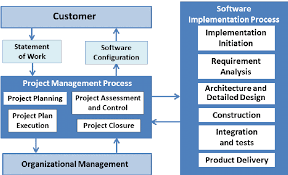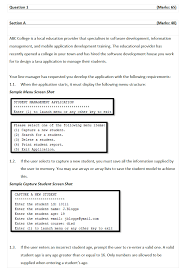Navigating the Software Development Process: A Comprehensive Guide
The Software Development Process: From Concept to Completion
Software development is a complex and iterative process that involves designing, coding, testing, and deploying software applications. It requires a systematic approach to ensure the final product meets the needs and expectations of users. Let’s explore the key stages of the software development process:
Planning
The first stage of software development involves defining the project scope, requirements, and objectives. This phase includes gathering user feedback, conducting market research, and creating a detailed project plan.
Design
In the design phase, developers create a blueprint for the software application based on the requirements gathered in the planning stage. This includes defining the architecture, user interface design, data structures, and algorithms.
Implementation
During implementation, developers write code based on the design specifications. This phase involves coding, unit testing, integration testing, and debugging to ensure that the software functions as intended.
Testing
Testing is a critical phase of software development where developers verify that the application works correctly and meets quality standards. This includes functional testing, performance testing, security testing, and user acceptance testing.
Deployment
Once the software has been thoroughly tested and approved, it is deployed to production environments for end-users to access. Deployment involves configuring servers, setting up databases, and ensuring smooth operation of the application.
Maintenance
After deployment, software requires ongoing maintenance to address bugs, add new features, and improve performance. Maintenance may involve releasing updates, patches, and enhancements to ensure that the software remains relevant and functional over time.
In conclusion,the software development process is a multi-faceted journey that requires collaboration between developers,designers,and stakeholders to create successful software applications that meet user needs.
9 Key Benefits of the Software Development Process: Boosting Efficiency, Security, and Innovation
- Enhances efficiency by automating tasks
- Improves scalability for future growth
- Enables customization to meet specific requirements
- Facilitates collaboration among team members
- Ensures better quality through rigorous testing
- Increases security measures to protect data
- Provides opportunities for innovation and creativity
- Supports continuous improvement through feedback loops
- Helps businesses stay competitive in the digital age
Challenges in Software Development: Navigating Complexity, Time, and Cost
Enhances efficiency by automating tasks
Software development process enhances efficiency by automating tasks, allowing repetitive and time-consuming processes to be completed quickly and accurately. Automation reduces human error, increases productivity, and frees up resources to focus on more complex and strategic aspects of software development. By streamlining routine tasks through automation, developers can deliver high-quality software solutions in a more efficient and timely manner.
Improves scalability for future growth
One significant advantage of the software development process is that it enhances scalability for future growth. By following a structured development approach, software applications can be designed and built with scalability in mind, allowing them to accommodate increased user loads, data volumes, and feature enhancements as the business expands. This proactive approach to scalability ensures that the software can adapt to changing requirements and support the organization’s growth without requiring a complete overhaul or redevelopment, ultimately saving time and resources in the long run.
Enables customization to meet specific requirements
The software development process offers a significant advantage by enabling customization to meet specific requirements. This flexibility allows developers to tailor software applications to the unique needs and preferences of users or businesses. By incorporating custom features, functionalities, and design elements, developers can create solutions that align perfectly with the desired outcomes and objectives of the project. This level of customization not only enhances user satisfaction but also improves overall efficiency and effectiveness, making software development a powerful tool for addressing specific needs and challenges.
Facilitates collaboration among team members
Facilitating collaboration among team members is a key advantage of the software development process. By breaking down complex tasks into manageable components and establishing clear communication channels, team members can work together efficiently towards a common goal. Collaboration fosters creativity, innovation, and synergy among team members, leading to the development of high-quality software solutions that meet user needs effectively. Additionally, collaboration allows for the sharing of knowledge and expertise, enabling team members to learn from each other and continuously improve their skills. Ultimately, a collaborative approach in software development not only enhances productivity but also promotes a positive and supportive work environment conducive to success.
Ensures better quality through rigorous testing
Rigorous testing within the software development process ensures better quality by identifying and resolving issues early on, leading to a more reliable and stable end product. Through comprehensive testing procedures, developers can detect bugs, errors, and performance issues, ultimately enhancing the overall user experience and satisfaction. By prioritizing quality assurance throughout each stage of development, software products can meet industry standards and exceed customer expectations for functionality and reliability.
Increases security measures to protect data
One significant advantage of the software development process is its ability to enhance security measures to safeguard sensitive data. By incorporating robust security protocols and encryption techniques during the development stages, software developers can effectively protect user information from unauthorized access and cyber threats. This proactive approach not only ensures the confidentiality and integrity of data but also instills trust and confidence in users, ultimately contributing to a more secure digital environment.
Provides opportunities for innovation and creativity
The software development process offers a unique advantage by providing ample opportunities for innovation and creativity. Developers have the freedom to explore new ideas, experiment with different technologies, and devise creative solutions to complex problems. This environment fosters a culture of innovation where novel concepts can be brought to life through software applications. By encouraging creativity throughout the development cycle, teams can push boundaries, inspire new approaches, and deliver truly innovative solutions that meet the evolving needs of users and businesses alike.
Supports continuous improvement through feedback loops
The software development process excels in supporting continuous improvement through feedback loops. By incorporating feedback from users, stakeholders, and testing phases, developers can identify areas for enhancement and refinement. This iterative approach enables teams to make incremental adjustments, address issues promptly, and deliver a product that evolves based on real-world usage and feedback. This continuous feedback loop fosters innovation, ensures user satisfaction, and ultimately leads to the development of high-quality software solutions that meet the ever-changing needs of users and the market.
Helps businesses stay competitive in the digital age
In the fast-paced digital age, the software development process plays a crucial role in helping businesses stay competitive. By continuously updating and enhancing their software applications, businesses can adapt to changing market demands, improve efficiency, and deliver better customer experiences. Embracing modern software development practices allows companies to innovate, streamline processes, and leverage technology to gain a competitive edge in the ever-evolving digital landscape.
Complexity
The complexity of the software development process can pose a significant challenge, particularly in the context of large-scale projects involving numerous stakeholders and evolving requirements. Managing the intricacies of such projects demands careful coordination, effective communication, and adaptive strategies to navigate through uncertainties and complexities. The dynamic nature of software development often requires teams to be agile and responsive to changes, making it essential to have robust project management practices in place to address the challenges posed by complexity.
Time-consuming
Developing high-quality software can be a time-consuming process due to the need for meticulous attention to detail and rigorous testing at every stage, from planning to testing. Each phase of software development demands careful consideration and precision to ensure that the final product meets quality standards and user expectations. Rushing through any part of the process can lead to errors, bugs, and ultimately compromise the integrity and functionality of the software. Therefore, investing time in each step is essential to deliver a reliable and efficient software solution in the end.
Cost
One significant drawback of the software development process is the cost involved. Developing software can be a costly endeavor, especially when unexpected challenges surface throughout the project, leading to the need for extra resources or modifications to the original plan. These unforeseen issues can escalate expenses and strain budget allocations, making it crucial for development teams to carefully manage resources and anticipate potential obstacles to mitigate financial risks during the software development lifecycle.





